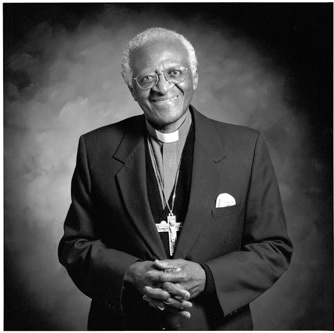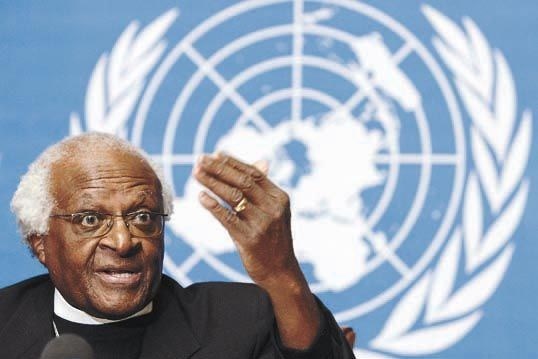 |
| Desmond Tutu (Desmond Tutu. Santa Clara University. Web. 1 Jan. |
Desmond Tutu was born October 7th, 1931 in Klerksdorp, South Africa. Tutu is married to Nomalizo Shenxane and they have four children. Before he became a priest he was a teacher, he earned a teaching diploma and bachelor of arts degree, from the Pretoria Bantu Normal College and University of South Africa respectively. After a few years of teaching, Tutu quit in protest. He was protesting against black education's low standards caused by the use of the Apartheid laws in South Africa. Tutu, done with teaching, decided to become a priest in 1961. In 1962 he moved to London to get a masters in theology, and in 1975 he returned to Africa where he became the Anglican Dean of Johannesburg.
 |
| South Africa (South Africa. Aanwins. Web. 17 Feb. 2010. |
During his life he continually spoke out against Apartheid. Apartheid was government sanctioned racism. Apartheid became official with the Population Registration Act implemented in 1950. The act separated people into different groups: Bantu which were black Africans, Coloured which were mixed races, Indians and Pakistanis, and Whites. Apartheid had been in use long before then but the National party extended it and gave it a name. The point of Apartheid was to make it so that whites and non whites were separated. This resulted in separation in housing, education, and removing non whites from politics, as well as taking away many rights. Apartheid finally ended in 1994 when a new constitution in South Africa abolished it.
His resistance caused him to have many problems with the police. He even had his passport confiscated - the government was scared that he would travel abroad and tell other countries of his plight - and was briefly jailed. Tutu used his position as the Bishop of Lesotho to stage his fight against apartheid. His goal was "a democratic and just society without racial divisions". Tutu frequently compared the Apartheid system to Nazism and Communism. In 1978 he became the secretary-general of the South African Council of Churches, which allowed him to continue his protests of Apartheid, and this time with the full backing of nearby churches. Tutu always denounced the actions of violent anti-apartheid groups as terrorists.
In 1984 he was recognized for his efforts against Apartheid by being awarded a Nobel Peace prize and in 1986 he was the first black to lead the Anglican Church in South Africa, as well as being named the first black Archbishop of Cape Town.
 |
| Desmond Tutu (Desmond Tutu. Church Times. Web. 23 Feb. 2010. |
He was a big supporter of civil protest, and his position as Archbishop allowed him to pressure the government internationally, which eventually helped to force the government to reform. Nelson Mandela, now president of South Africa after the first multiracial elections, put Tutu on the Truth and Reconciliation Commission. The Truth and Reconciliation Commission investigated the human rights violations of the Apartheid laws. Desmond Tutu retired in 1996.
"We are the rainbow people of God! We are unstoppable! Nobody can stop us on our march to victory! No one, no guns, nothing! Nothing will stop us, for we are moving to freedom! We are moving to freedom and nobody can stop us! For God is on our side!"
-Speech given at the funeral of Chris Hani, the leader of the South African Communist Party, in 1993
Desmond Tutu believes in Christianity and in the Catholic religion. Tutu says that he reads from the bible everyday, even though some people do not follow or believe its teachings. He says that: “You have to understand that the bible is really a library of books and it has different categories of material.” Despite this he also says that there are some parts of the bible he does not believe should have been accepted; such as slavery being accepted, and women not being allowed to speak in church.“There are many things that you shouldn’t accept.”
Desmond Tutu did not follow all ways of the Christian faith. He opposed the Christian discrimination of homosexuals. He believes that as long as they remain celibate it's okay. Tutu said: “It is sad the church is spending time disagreeing on sexual orientation when we face so many devastating problems such as poverty, AIDS, HIV, war, and conflict.”
In 2009 Desmond joined the group “Soldiers of Peace.” Which is a movement that was against all war and for peace. He also endorsed actions against hunger. As well as being a counselor at “One Young World”, which is an organization that hopes to bring many of tomorrows young leaders from every country of the world.
Tutu stands for social environmental justice worldwide.
"About Desmond Tutu." The Desmond Tutu Peace Centre. Mammoth Solutions, n.d. Web. 17 Feb. 2010.
"Forging Equality in South Africa." Academy of Achievement. N.p., 2 Oct. 2009. Web. 17 Feb. 2010.
Page created on 3/8/2010 12:00:00 AM
Last edited 3/8/2010 12:00:00 AM
